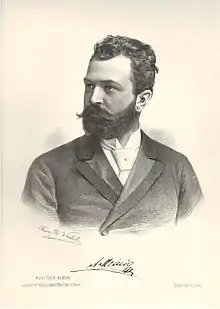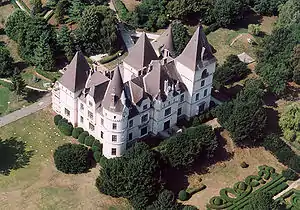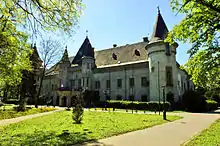Arthur Meinig
Arthur Meinig (Hungarian: Meinig Arthur) was a German-born Hungarian architect. He was born in Waldheim, Saxony on 7 November 1853 and died in Budapest on 14 September 1904. After studying in Dresden, he worked for architects Fellner and Helmer in Vienna.[1] In 1883 he moved to Budapest and soon became the favorite architect of Hungarian aristocracy.[1] He created buildings in the styles of Neo-Gothic, Neo-Renaissance, and especially in Neobaroque.
Arthur Meinig | |
|---|---|
 Portrait of Arthur Meinig around 1883 (lithography by Franz Würbel) | |
| Born | Arthur Meinig 7 November 1853 |
| Died | 14 September 1904 (aged 50) |
| Nationality | Hungarian, German |
| Alma mater | TU Dresden, Dresden |
| Occupation | Architect |
| Spouse(s) | Angela Babarczi-Schwartzer |
| Practice | Ferdinand Fellner Hermann Helmer |
| Buildings | Andrássy Palace Wenckheim Palace Károlyi Castle |

Andrássy Palace in Tiszadob from a bird's eye view

Károlyi Castle in Carei/Nagykároly
Works
- Emmer Palace, Budapest, 1885-1887.
- Andrássy Palace, Tiszadob, Hungary, 1885-1886/1890.
- Wenckheim Palace (now Metropolitan Ervin Szabó Library), Budapest, 1886-1889.
- Mausoleum of the Andrássy Family, Trebišov, (Hungarian: Tőketerebes) now Slovakia, 1891-1893.
- The Mausoleum is one of the most beautiful monuments in Trebišov. It was built in the neo-Gothic style by Arthur Meinig. The sarcophagus is a work of the Hungarian sculptor György Zala from the years 1893–1895. In the mausoleum there is buried the count Gyula Andrássy from 1894, the prime minister of Austria-Hungary (1867). In the sarcophagus there are relicts of his wife Katalin Andrássy. Above the sarcophagus there are two bronze cartouches with the signs of the count and his wife. Beside that there is the tinny coffin of Tódor Andrássy (1857–1905). Their souls are protected by the sculpture of an angel. Near the sarcophagus sorrows the bronze sculpture of Helena, the wife of the count Lajos Batthyány. In the interior there are the starry vault and the Neo-Gothic windows.
This article is issued from Wikipedia. The text is licensed under Creative Commons - Attribution - Sharealike. Additional terms may apply for the media files.
